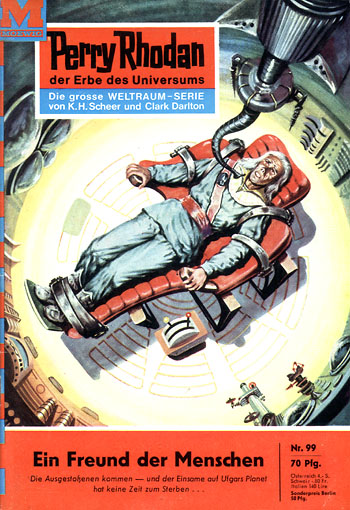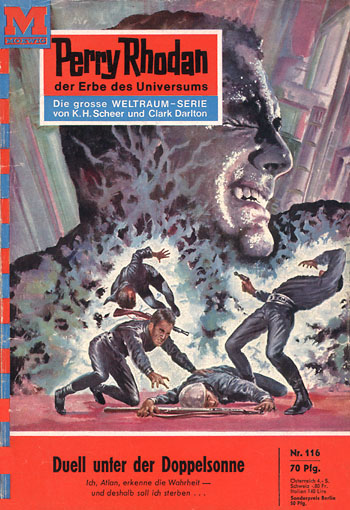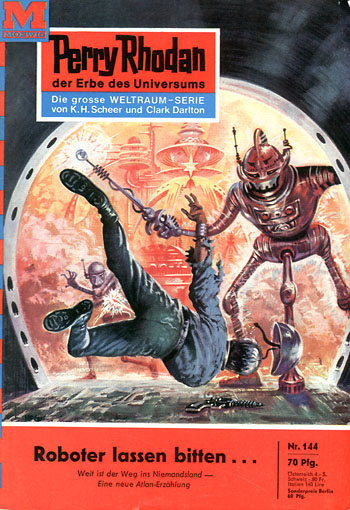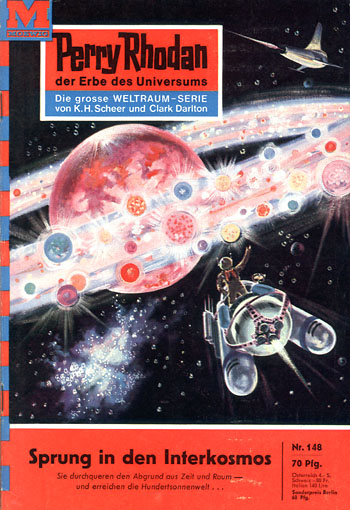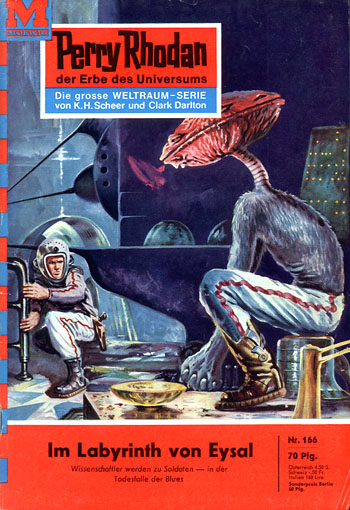
by Cora Buhlert
Interesting Times
"May you live in interesting times" is supposedly an ancient Chinese curse, even though the proverb is completely unknown in China.
But be that as it may, we are certainly living in very interesting times, because it has been a long, hot summer of protests and violence here in Europe as well as abroad. Whether in Paris, Prague, Zurich, Rome, Warsaw, Bonn or West Berlin, whether on the western or eastern side of the iron curtain, it seems as if every single day there is another protest, another riot and the violent response of the authorities in the news.






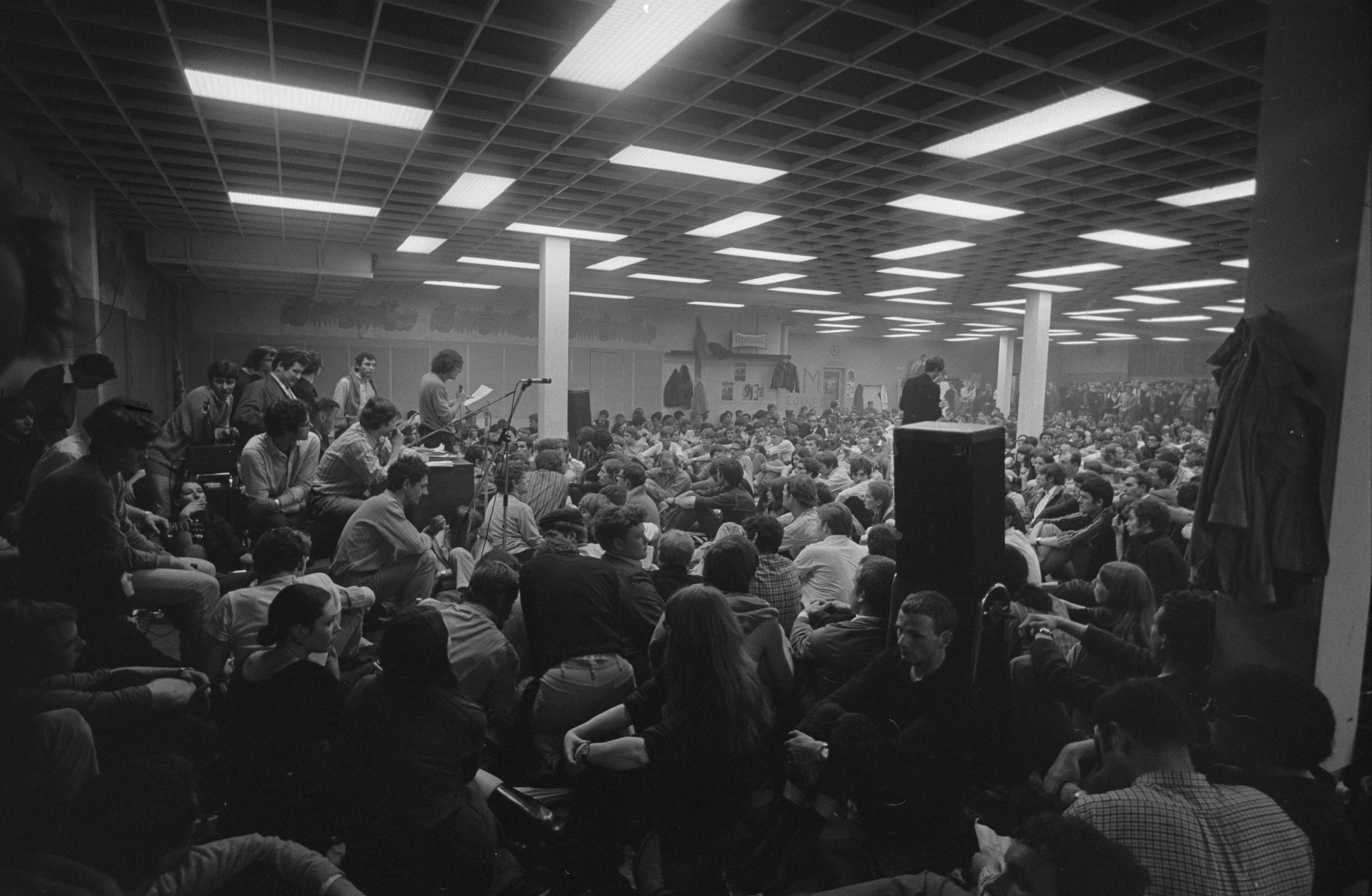
Burning Streets and Sappy Songs
Maybe the fact that this has been such a violent year is the reason why the pop songs dominating the West German charts are so extremely saccharine. Songs by the Beatles or the Rolling Stones regularly hit the West German charts, but the breakout star of 1968 in West Germany is a young Dutch singer known as Heintje (real name Hein Simons) who just celebrated his thirteenth birthday last month.

Now young Heintje has a beautiful voice – at least for now, because puberty will eventually hit. However, the songs he is made to sing are painfully saccharine. His breakout hit was "Mama", a song that's already thirty years old and was originally written for Beniamino Gigli. His follow-up "Du sollst nicht weinen" (You shall not cry), a version of "La Golondrina", a Mexican song that is already more than a hundred years old, is currently topping the West German charts. And Heintje (or rather his manager) have even more plans. A new song called "Oma so lieb" (Grandma so kind) is coming out soon and Heintje will also appear in the movie Zum Teufel mit der Penne (To Hell With School).
Meanwhile, enjoy this performance of his breakout hit "Mama":
Escape at the Newsstand
While some are seeking escape from the violence on the news in sappy pop songs, others head for the spinner rack at their local newsstand to peruse the offerings and lose themselves in fantastic worlds.


I've written before about the so-called “Heftromane”, digest-sized 64-page fiction magazines sold at newsstands, gas stations, grocery stores and wherever magazines are sold. West German newsstands carry a bewildering array of "Heftromane" in variety of genres. Westerns, crime novels, war novels and romance novels with subgenres such as aristocratic romance, Alpine romance and medical romance are still the most popular, but there are also a number of science fiction series to be found.
The State of the United Galactic Empire
The eight hundred pound gorilla of West German science fiction is still Perry Rhodan. The series launched in September 1961 and is still going strong seven years later. In fact, I just picked up issue No. 366 today.

It has been almost four years, since I last checked in on Perry Rhodan's adventures in these pages, and a lot has happened since then.
Perry Rhodan's own Solar Empire and the Great Empire of Perry's Arkonian allies joined forces to form the United Galactic Empire. However, this new Empire continues to be beset by crises from within and without. And so Perry Rhodan and friends have been travelling to distant galaxies and also tangling with time cops.
A major internal crisis facing the United Galactic Empire was the revolt of the planet Plophos. Under the rule of the tyrannical Iratio Hondro, the Plophosians managed to shoot down Perry Rhodan's flagship Crest, imprisoned the crew and tried to poison them. However, Perry Rhodan managed to escape with the aid of Mory Abro, daughter of a Plophosian opposition leader.
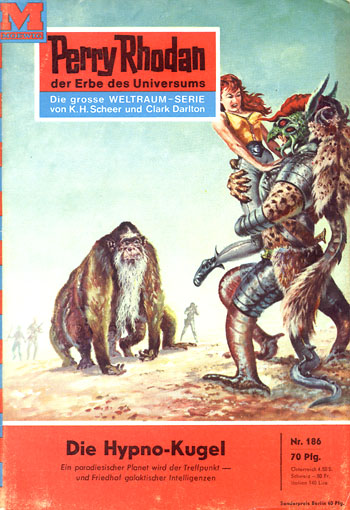
Initially, Mory and Perry disliked each other intensely, but during their perilous flight they fell in love. Eventually, Perry Rhodan and Mory Abro were married and had twins, a girl named Suzan Betty and a boy named Michael Reginald. So Perry Rhodan finally found some happiness after losing his first wife Thora all the way back in issue 78.
Since Perry Rhodan and most of his supporting cast are near immortal due to their cellular activators, time moves fast in the series and so the twins are already adults in the current issues. Suzan Betty studied mathematics, founded a chain of banks and eventually married the brilliant but scatterbrained scientist Geoffry Abel Waringer, initially against her parents' wishes.
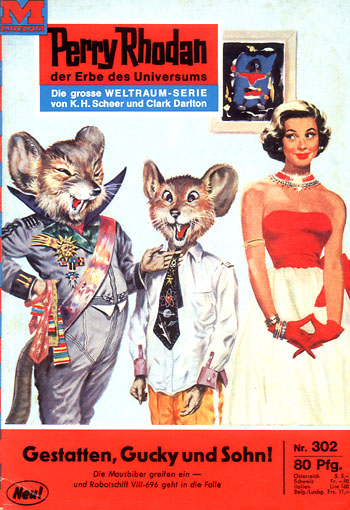
Unlike his sister, Michael Reginald Rhodan chafed against finding himself in the shadow of his father. He ran away from home several times as a boy and finally left for good at age twenty-four. Fascinated by the French Revolution, he took the name Roi Danton, started dressing in eighteenth century garb for reasons best known to himself and joined the Free Traders, eventually rising to their king.
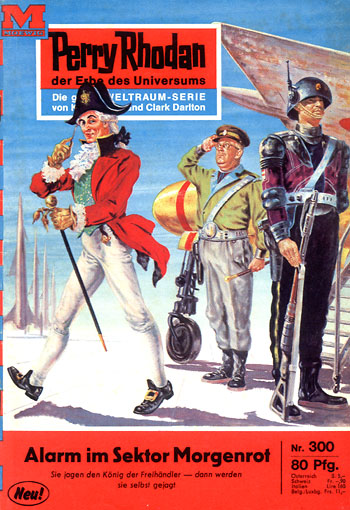
Since the death of Thora, Perry Rhodan was sorely lacking in regular female characters, so Mory Abro and Suzan Betty Rhodan are welcome additions to the series. Even more welcome would be women authors, for the writing staff of Perry Rhodan is still all male. Which is a massive oversight, especially since West Germany does have female science fiction writers such as Lore Matthaey, prolific writer, translator and editor of the Utopia Zukunftsroman series, or the writer behind the pseudonym Garry McDunn, who I have on good authority is actually a woman.
Perry Rhodan's Rivals
Success breeds imitators and so other "Heftroman" publishers launched their own science fiction series, all inspired by Perry Rhodan and all inevitably starring square-jawed spacemen.
I already wrote about Ren Dhark, the Martin Kelter publishing company's foray into the science fiction genre. The brainchild of Perry Rhodan writer Kurt Brand, the saga about Terran colonists who crash-landed on the planet Hope is still going strong two years later. By now, the Terrans and their leader Ren Dhark have found not only traces of intelligent aliens they've named the Mysterious (because no one knows what they look like) but also a giant spaceship called Point of Interrogation. Ren Dhark and his crew repaired and launched the Point of Interrogation and are currently searching for both the Mysterious and Earth, which Ren Dhark, who was born in space aboard the colony ship Galaxis, has never seen.
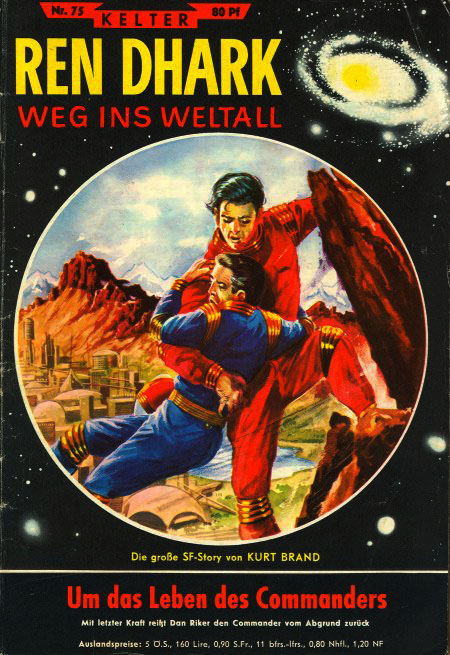
Ren Dhark is enjoyable enough and has gradually also established its own identity as more than just a Perry Rhodan copy. The mystery behind the mysterious Mysterious is certainly compelling, though I hope the resolution, when it eventually comes, lives up to the mystery.

In November 1966, Bastei Verlag entered the science fiction arena with Rex Corda – Der Retter der Erde (Rex Corda – Saviour of the Earth). The brainchild of West German science fiction author H.G. Francis (real name Hans Gerhard Franciskowsky), the series finds Earth first near destroyed in a nuclear war and then caught in the middle of an intergalactic conflict between the Laktones and the Orathones, which has lasted for millennia. The titular characters Rex Corda is a US senator who tries to save the Earth from getting destroyed by the two warring factions.

Rex Corda is a lot more political than either Perry Rhodan or Ren Dhark and the parallels to the war in Vietnam are more than obvious. Maybe this is why Rex Corda only lasted for thirty-eight issues, ending last year.
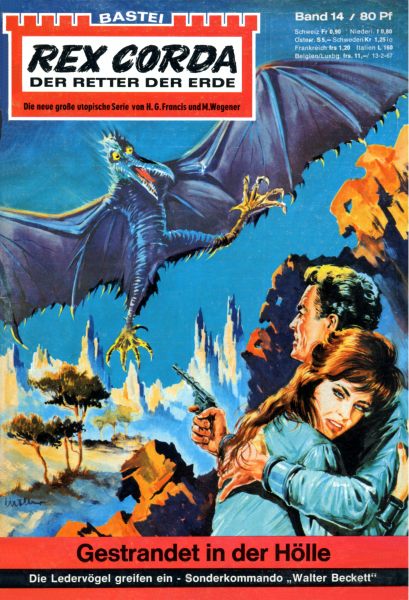
The End of Utopia
After the cancellation of Rex Corda, H.G. Francis and his writing team launched a new science fiction series in the pages of the long-running science fiction anthology series Utopia Zukunfsroman.
Ad Astra – Chet Morrows Weg zu den Sternen (Ad Astra – Chet Morrow's Way to the Stars) started last year. The series is set in a solar system not unlike what could be found in the pages of pulp magazines like Planet Stories twenty years ago. Chet Morrow serves as an ensign aboard the interplanetary spaceship Dyna-Carrier, which is beset by saboteurs. After unmasking the saboteurs, Chet Morrow is promoted to Second Lieutenant and has many adventures around the solar system, while finding traces of alien visitors. Eventually, Chet Morrow becomes commander of the interstellar spaceship Sword of Terra and heads the first expedition to Alpha Centauri, which not only turns out to be inhabited, but also houses a human colony consisting of the descendants of ancient Romans who were abducted by aliens.
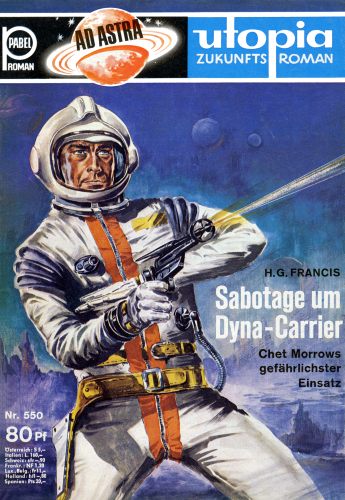
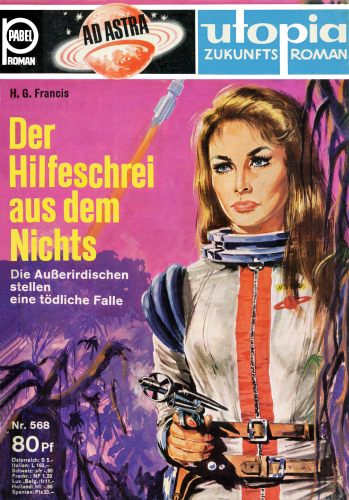
Ad Astra was certainly thrilling, and indeed the quality of the two H.G. Francis science fiction series Rex Corda and Ad Astra was higher than the average Perry Rhodan clone. Alas, Ad Astra was prematurely cut short, when Utopia Zukunftsroman was cancelled earlier this year after fifteen years. Worse, Ad Astra ended on a down note with the Earth and much of the solar system seemingly destroyed by a rogue comet.
Utopia Zukunftsroman may be history, but its competitor Terra Science Fiction is still being published, though the anthology series was rebranded as Terra Nova this year. The publisher Zauberkreis Verlag also entered the science fiction anthology market with Zauberkreis SF two years ago.
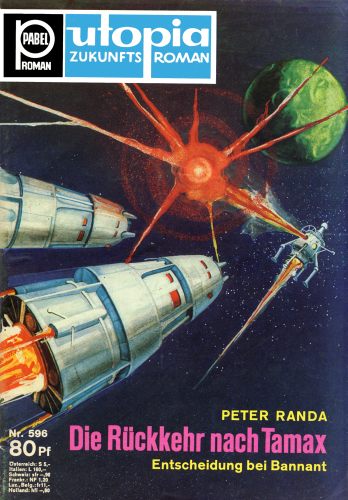
But even if the West German "Heftroman" market does not look too promising for any science fiction series not named Perry Rhodan, a very interesting series in another genre just launched.
Things Get Spooky
Silber-Krimi (Silver Mystery) is a long-running crime fiction anthology series which started in 1952. Over the years, several recurring sleuths popped up in the pages of Silber-Krimi, the best known of them FBI Agent Jeff Conter and the crime-solving Butler Parker. But while the crimes in Silber-Krimi may occasionally seem far-fetched, they are still happening in our world.

This changed with issue 747 in July, when the regular Silber-Krimi bore the subtitle "Silber Grusel Krimi – Ein Roman für starke Nerven" (Silver Spooky Mystery – a novel for readers with strong nerves). Intrigued, I picked up the issue and was treated to "Das Grauen schleicht durch Bonnards Haus" (Horror creeps through Bonnard's house) by the appropriately named Dan Shocker.
After a spooky opening with a young man being pursued by beings unknown, the novel introduces us to Larry Brent, an FBI agent on holiday in France. FBI agents are popular protagonists in West German crime fiction, likely due to the enormous success of the "Heftroman" series G-Man Jerry Cotton.
However, it's very much a busman's holiday for Larry Brent, for no sooner has he arrived in France than he finds a body, completely drained of blood. Regular readers of spooky stories will find this quite ominous. And indeed, Larry Brent is attacked by a bona fide vampire soon thereafter. He vows to stop the bloodsucking fiend and finds that he is not the only one who is investigating the vampire killings. No, an agent of a mysterious organisation named PSA (short for Psychoanalytische Spezialabteilung, i.e. Psychoanalytic Special Unit) is also on the case. The story ends with the vampires vanquished and Larry Brent becoming on agent of the PSA himself.
"Das Grauen schleicht durch Bonnards Haus" is a satisfying horror novel, though the author clearly has no idea what psychoanalysis is and that it has nothing to do with investigating paranormal phenomena and everything with Sigmund Freud. Nonetheless, the novel proved popular enough that Larry Brent is getting a second outing this month.
But who is the author behind the outlandish pseudonym Dan Shocker? Well, it turns out that he is Jürgen Grasmück. Though only twenty-eight years old and using a wheelchair since his teens, Grasmück has already had a lengthy career. He started writing science fiction novels at sixteen and was a staff writer on both Ad Astra and Rex Corda. Grasmück tended to include horror elements into his science fiction novels and has clearly found his calling with the Larry Brent novels.
Quo Vadis, Heftroman?
Even though Perry Rhodan continues to be popular, other science fiction series have had a hard time in the West German "Heftroman" market. Will we eventually see another challenger to Perry Rhodan arise or was Ad Astra the last attempt to establish an ongoing science fiction series?
Meanwhile, occult investigator Larry Brent is an intriguing new character to arrive in the pages of the rather staid Silber-Krimi. Will his adventures continue, or will Larry Brent's second case also be his last?
We'll find out… at the newsstand.


![[September 6, 1968] Adventures for a Dime: Science Fiction and Horror Dime Novels in West Germany](https://galacticjourney.org/wp-content/uploads/2023/09/UTOPIA_SF_568-349x372.jpg)

![[November 5, 1964] The State of the Solar Empire: <i>Perry Rhodan</i> in 1964](https://galacticjourney.org/wp-content/uploads/2019/11/PR0107-350x372.jpg)








